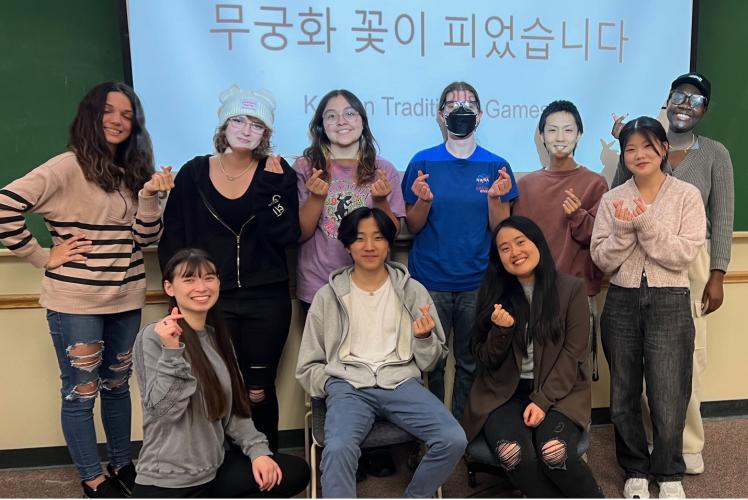
How a linguistics grad student discovered that cultural enthusiasm drives language learning success

Yesung Chung is a second-year student in the M.A. in Applied Linguistics graduate program, and like her colleagues she has a full load of courses and assignments to keep her busy. So why did she decide to start offering Korean lessons?
“As an international student from South Korea,” she explained, “I was often approached by students on campus, their eyes glistening with their curiosity about the tangy flavor of kimchi, passion for singing along to BTS songs, and unceasing effort to understand their Korean stars' letters to fans in Korean.”
Confronted by the intensity of motivated students with no means to study Korean at OHIO, she decided to take the initiative and start a Korean learning group.
Putting Her Teaching Experience to Work
“At first, I was insecure about taking on the Korean teacher role because I only had experience teaching English as a second language back in South Korea," she said.
But she reasoned that; she had been speaking Korean her whole life, and because of her time teaching English, she realized that she had the pedagogical knowledge and skills to teach other languages. But what really convinced her to start teaching Korean classes was her realization that “it would be a meaningful effort to support learners who genuinely wish to learn out of their own curiosity, not from external pressure, which was often the case with English in Korea.”
Chung’s students’ curiosity was not only motivated by their love of K-pop and Korean food. Many students were fans of K-dramas such as "A Good Day to Be a Dog," "Squid Game," and "Extraordinary Attorney Woo."
Sarah Campbell (Anthropology '27) and Savannah Barnes (Linguistics '24) expressed their desire to also live and work in South Korea. Yu Tazaki (M.A. Applied Linguistics '24) had attended a conference in South Korea and loved the time he spent there. And several students like Charlene Chen (Linguistics '24), who have already studied Japanese and Chinese at OHIO, wanted to learn more East Asian languages and cultures.
Bonding over Language Learning
Enthusiasm for Chung’s class has been super high.
Sarah Rocha (Graphic Design '26) found it was definitely a different way of learning a language. “I loved the focus on how it sounds and the flow rather than just going straight to grammar.”
Chen said, “We have a really fun teacher that gives us creative materials. I really enjoy our role-playing activities and we're encouraged to have fun with it.”
Barnes agreed. “This class is very fun! It combines fun games, dialogues and grammar exercises for an optimal learning experience.”
In addition to the content of the class, the students also felt that the class gave them a sense of community.
Yoseb Choi (Electrical Engineering '27) said he enjoyed the class not only because he learned a lot about language and culture, “but also because it’s been a fun environment to be in where I have met lots of people with a common interest.”
Campbell agreed. “Wednesday nights, when classes are held, are the best part of my week, because not only am I furthering my education in something I am passionate about, I am also bonding with others who share the same goal,” she said.
Meeting a Growing Desire
As for Chung, she found the class a fantastic learning experience as a language teacher.
“It was truly a privilege to provide my services to highly motivated learners who genuinely wanted to learn more about my cultural background. The biggest lesson that I learned by teaching this course is the importance of intrinsic motivation. I witnessed that their motivation built on curiosity is so strong that it can help them with their persistence in strategizing how to overcome challenges,” Chung said.
When asked about this enthusiasm for Korean, Dr. David Bell, chair of the Linguistics Department, responded, “We have been wanting to offer Korean for many years now. We have had several Korean faculty in the department, and given the enormous interest in Korean, it is very doable. I am so grateful that we have such a talented teacher as Yesung Chung, who has so generously offered this opportunity to our students.”
Bell likened the interest in Korean to Italian.
“They both roughly have the same number of speakers (80 million) and rank about twenty-fifth in the most spoken languages, yet despite their rankings, they both attract a disproportionate number of learners who are drawn to the richness of the cultures they represent.”
And now, Bell noted, there is real evidence of the boom in Korean learners. According to the 2023 Duolingo Language Report, Korean has jumped to sixth place, overtaking Italian, in the global ranking of the most studied languages. And that is not just in the United States. In India, Korean has grown by 75% year-over-year and ranks as the fifth most studied foreign language there.
What’s more, Duolingo reports that around the world, Korean language learners are younger than those studying Japanese and Chinese, and this is especially true in Brazil, India, and Mexico, where at least 70% of learners are between 13 and 22. In Brazil, 47% of Korean learners are between the ages of 13 and 17.
There has been one tangible outcome of Chung’s Korean class.
“The class and the friends I have made have inspired me to co-found, along with Yoseb Choi and other students in the class, a Korean Culture Club (KCC) for the upcoming fall semester in order to maintain the Korean culture-focused environment that is slowly blossoming at OU," Sarah Campbell said.
